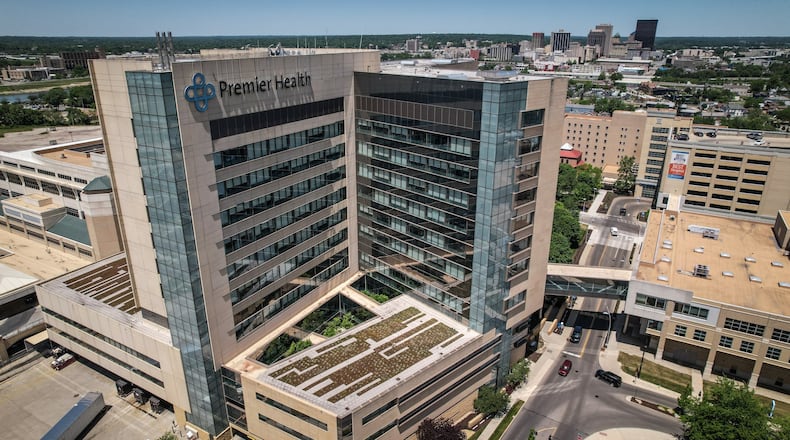Premier Health also wants more health services to be closer to home for those in the Dayton region through this partnership, so patients wouldn’t need to travel to other metropolitan areas to other academic medical centers.
“Our biggest growth opportunity is to take care of patients who live in our communities, in our backyards today, and who are leaving go to Columbus, Cincinnati and Cleveland, Indianapolis. And we want them to stay here, and there’s significant growth opportunity for that,” said Dr. Chad Whelan, president of Miami Valley Hospital and Premier Health’s chief operating officer.
Credit: JIM NOELKER
Credit: JIM NOELKER
Increased opportunities for funding
There will be new federal dollars available to Premier for these residency programs as the Centers for Medicare and Medicaid see those programs as investments, Whelan said.
They are also anticipating starting to receive funds from federally directed, payment-matching programs in 2024, he said, having worked closely with legislators in the state of Ohio.
“We do believe that with a tighter affiliation that there may be possibilities to significantly expand this funding,” Whelan said. “And this is actually very similar to how the academic medical centers in every other metro area in the state of Ohio have already done, and so it’s really just bringing those kinds of dollars to the community of Dayton that honestly deserves it.”
Benefits to the community
Whelan knows the benefits an academic medical center can add to the health system, the academic institution affiliated with the center, and the community at large, having spent the majority of his career at academic medical centers in Minnesota, Michigan, Chicago, and Arizona, he said.
“It will be good for the community in ways that will be hard to imagine, and really the impact will be in the decades to come,” Whelan said.
Premier Health is anticipating the programs they are planning for Upper Valley Medical Center and Atrium Medical Center to be based in primary care, which Whelan said connects with Wright State’s interest in research around population health.
Premier Health plans to explore other opportunities to build upon shared clinical missions, educational programs, and research programs with Wright State’s Boonshoft School of Medicine. Premier will also expand clinical training at Miami Valley Hospital.
Credit: JIM NOELKER
Credit: JIM NOELKER
More educational, research opportunities
This partnership will expand on opportunities for students at Wright State’s Boonshoft School of Medicine. The current size of incoming Boonshoft School of Medicine classes is 130 students, and that number is impacted by both the capacity of facilities on Wright State University’s campus and availability of clinical rotation experiences.
This enhanced affiliation will expand the number and type of rotation opportunities at additional Premier Health clinical sites, Wright State’s office of communications said. Currently, there are over 360 medical residents and fellows training in 16 different specialties in Dayton.
Wright State’s Boonshoft School of Medicine is already working on adding new residency and fellowship training programs, including in neurosciences, the university said.
The school is continuing to evaluate and identify areas where there is a need for workforce development, which will guide decisions to add residency programs in specialties that might not be available locally, the university said.
For example, residencies in neurosurgery, interventional radiology, pathology, or physical medicine and rehabilitation currently do not exist in Dayton, so graduating medical students matching into those specialties need to go elsewhere for training.
Employment growth anticipated
As an employer of approximately 11,685 people, Premier Health is anticipating adding new jobs as part of this affiliation.
As part of the agreement, the dean of WSU’s Boonshoft School of Medicine will also serve as chief academic officer at Premier Health, reporting to both institutions. A national search has begun for that role.
Wright State and Premier Health made their first official academic affiliation agreement in 2021, with the intent of generating a stronger and clearer pipeline from the classroom to health workers rooted in the Dayton region. The agreement made each other preferred partners for medical residencies and opportunities for healthcare workers to further their education.
The 2021 agreement primarily applied between the Boonshoft School of Medicine and Premier, but this new arrangement applies to the entire university, across disciplines.
Wright State President Sue Edwards and Premier Health President and CEO Mike Riordan have been tasked by their respective boards to prepare a business plan defining and outlining the two organizations’ future operating relationship by April 30.
An ongoing partnership
Premier Health and Wright State University already collaborate in many ways. Current examples include:
- Joint training of medical and nursing students, physicians, professional nurses and other health care professionals in Southwest Ohio, fostering collaboration in academic, clinical and research initiatives.
- Support for Premier Health nurses pursuing a bachelor’s degree through Wright State’s nursing program.
- The Boonshoft School of Medicine is the academic sponsor for residencies in 12 medical specialties and fellowships in 13 subspecialty fields. Premier Health facilities serve as principal teaching sites for nearly all.
- Coordinating a rural family medicine residency program aimed at training physicians who will establish medical practices in underserved areas of rural Ohio.
- Collaboration in clinical trials conducted through the Wright State University and Premier Health Clinical Trials Research Alliance (CTRA). Approval for Premier Health clinical trials and studies involving human subjects is granted by Wright State’s Institutional Review Board.
- Uniting Wright State’s advanced biomedical research capabilities with Premier’s clinical resources through the establishment of the Wright State and Premier Health Clinical Neuroscience Institute.




